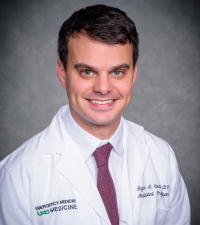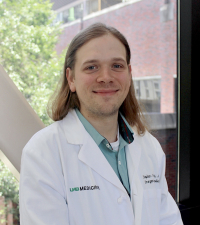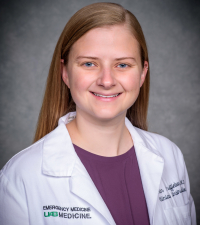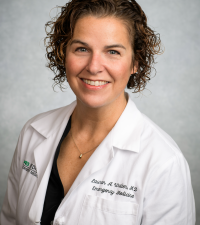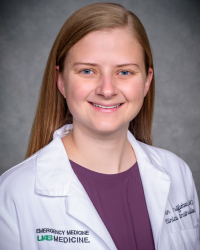About
Mission: The mission of the UAB Social Emergency Medicine and Population Health (SEMPH) Fellowship is to discover, teach, and mitigate the unique social determinants of health that impact patients who seek emergency care in the UAB Health System and across Alabama and the Southeast.
Vision: To equip emergency physician leaders, in alignment with their passion, to engage in research, education, and/or advocacy to mitigate the social determinants of health in underserved or marginalized populations in our region. We aim to improve health equity and eliminate health disparities as they relate to social, economic, environmental, racial, and gender-specific factors. In collaboration with our community partners, regional leaders and state leaders, we will develop, test, implement and disseminate interventions to improve population health through the lens of the emergency care system.
Objectives
- Research: To foster high-quality research to develop, test, and implement interventions that mitigate the social determinants of health, improve population health, and healthcare delivery across our region and state.
- Education: To promote the incorporation of patients’ social context into routine emergency care with a focus on underserved and vulnerable populations.
- Advocacy: To propose, evaluate, and advocate for health policies that affect the social determinants of health of our communities; To lead community outreach initiatives and serve as a resource for community and government organizations seeking to engage the emergency care system and address social factors affecting patients and their communities.
Curriculum
The SEMPH fellowship can take place over one or two years. Completion of a master's program (e.g. MSPH) may take place during a two-year fellowship. Core components include research, education, and advocacy as they pertain to SEMPH. The fellow will identify a single component of major focus and develop competencies in additional areas. Fellows will meet monthly with a primary mentor and receive biannual evaluations from the fellowship director to assess clinical performance and progress toward core components and fellowship goals. At least one research project of publication quality is required. Upon completion of the fellowship, graduates will have the necessary skills to facilitate career advancement in SEMPH both clinically and in at least one of three other areas (research, education, and/or advocacy). Personalization of the curriculum is encouraged to permit focus on each fellow's specific SEMPH interest and passion. The flexible curriculum requires collaboration with and approval from the fellowship director.
Focus areas
- Research: the development of fundamental skills in clinical and public health research to equip fellows to make a difference as leading researchers in SEMPH. This track includes focused research training on the design and conduct of clinical trials, biostatistics, epidemiology, population health interventions, grant writing, scientific manuscript writing, and practical experience implementing a public health intervention.
- Education: the development of fundamental medical education competencies to equip fellows to evolve as leading educators in SEMPH. This will include establishing expertise in a key area of SEMPH content and developing educational materials that advance SEM knowledge.
- Advocacy: the development of advocacy and leadership skills to equip fellows to evolve as physician leaders in SEMPH policy. This will include a practical internship with regional and state public health leaders, focused leadership development, and experience with advocacy on the national level.
- *Opportunities are available for collaboration/integration with the UAB Global Health/International Emergency Medicine fellowship (requires a two-year fellowship).
Current initiatives
- Universal HIV screening and care linkage
- Universal hepatitis C screening and care linkage
- Focused screening for opioid use disorder (OUD)
- Screening, brief intervention, and referral to treatment (SBIRT) to initiate medication assisted treatment (MAT) for patients with opioid use disorder (OUD)
- Sex and gender-based medicine residency and medical student education initiatives
- Sexual assault victim management residency and medical student education initiatives
- Monthly Street Medicine clinic in partnership with student-run free clinic Equal Access Birmingham
We seek to expand these ongoing initiatives and to initiate additional initiatives that align with the passion and interests of the fellow and address critical needs in our community (e.g., homelessness, food insecurity, gun violence prevention, intimate partner violence, sex trafficking).
Combined fellowship opportunities
Fellows may choose to complete combined fellowships in Global Emergency Medicine. Choosing to complete a combined fellowship will require a total of two years of study.
Application
To apply, submit a curriculum vitae (CV), two letters of recommendation, and a letter of interest to the Program Director and Education Coordinator.
Key Faculty
Walter, Lauren A., M.D., MSPH, FACEP
Vice Chair of Population Health & Research
Director of Research and Clinical Trials
